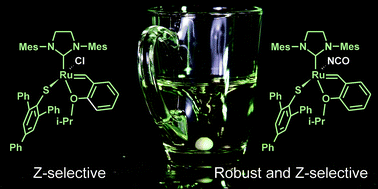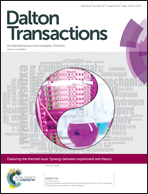Theory-assisted development of a robust and Z-selective olefin metathesis catalyst†
Abstract
DFT calculations have predicted a new, highly Z-selective ruthenium-based olefin metathesis catalyst that is considerably more robust than the recently reported (SIMes)(Cl)(RS)RuCH(o-OiPrC6H4) (3a, SIMes = 1,3-dimesityl-4,5-dihydroimidazol-2-ylidene, R = 2,4,6-triphenylbenzene) [J. Am. Chem. Soc., 2013, 135, 3331]. Replacing the chloride of 3a by an isocyanate ligand to give 5a was predicted to increase the stability of the complex considerably, at the same time moderately improving the Z-selectivity. Compound 5a is easily prepared in a two-step synthesis starting from the Hoveyda–Grubbs second-generation catalyst 3. In agreement with the calculations, the isocyanate-substituted 5a appears to be somewhat more Z-selective than the chloride analogue 3a. More importantly, 5a can be used in air, with unpurified and non-degassed substrates and solvents, and in the presence of acids. These are traits that are unprecedented among highly Z-selective olefin metathesis catalysts and also very promising with respect to applications of the new catalyst.

- This article is part of the themed collection: Synergy between Experiment and Theory

 Please wait while we load your content...
Please wait while we load your content...